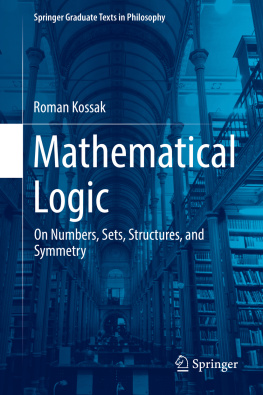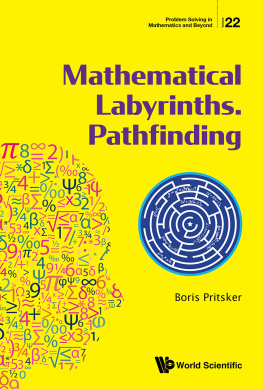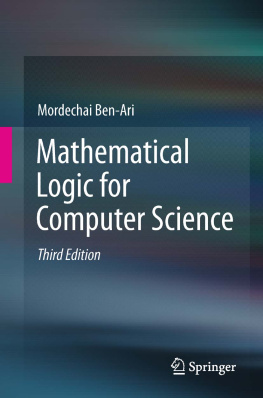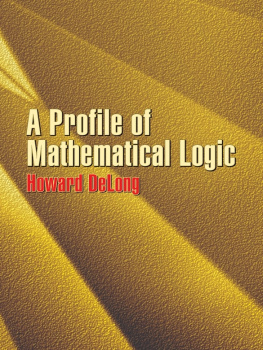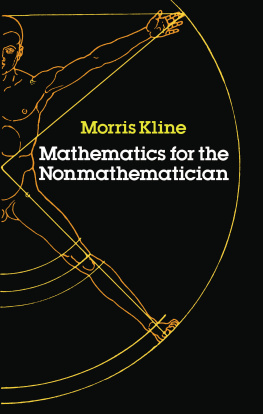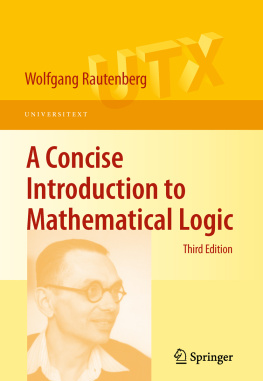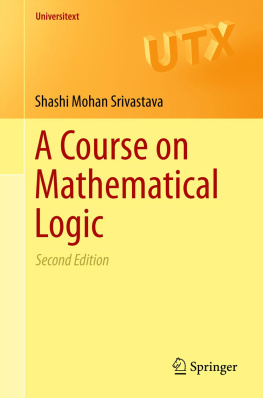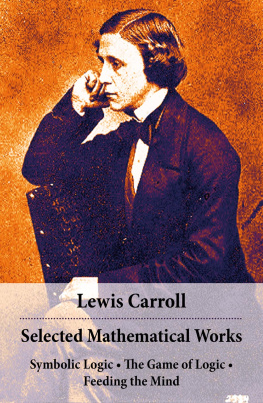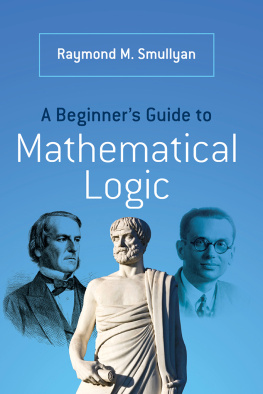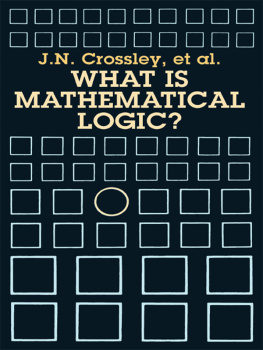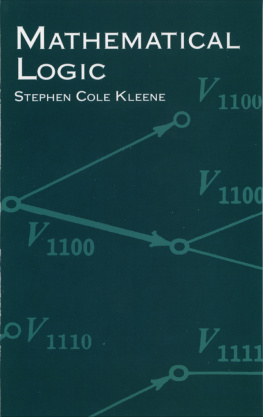Roman Kossak - Mathematical Logic
Here you can read online Roman Kossak - Mathematical Logic full text of the book (entire story) in english for free. Download pdf and epub, get meaning, cover and reviews about this ebook. year: 0, publisher: Springer International Publishing, genre: Children. Description of the work, (preface) as well as reviews are available. Best literature library LitArk.com created for fans of good reading and offers a wide selection of genres:
Romance novel
Science fiction
Adventure
Detective
Science
History
Home and family
Prose
Art
Politics
Computer
Non-fiction
Religion
Business
Children
Humor
Choose a favorite category and find really read worthwhile books. Enjoy immersion in the world of imagination, feel the emotions of the characters or learn something new for yourself, make an fascinating discovery.
- Book:Mathematical Logic
- Author:
- Publisher:Springer International Publishing
- Genre:
- Year:0
- Rating:3 / 5
- Favourites:Add to favourites
- Your mark:
- 60
- 1
- 2
- 3
- 4
- 5
Mathematical Logic: summary, description and annotation
We offer to read an annotation, description, summary or preface (depends on what the author of the book "Mathematical Logic" wrote himself). If you haven't found the necessary information about the book — write in the comments, we will try to find it.
Mathematical Logic — read online for free the complete book (whole text) full work
Below is the text of the book, divided by pages. System saving the place of the last page read, allows you to conveniently read the book "Mathematical Logic" online for free, without having to search again every time where you left off. Put a bookmark, and you can go to the page where you finished reading at any time.
Font size:
Interval:
Bookmark:
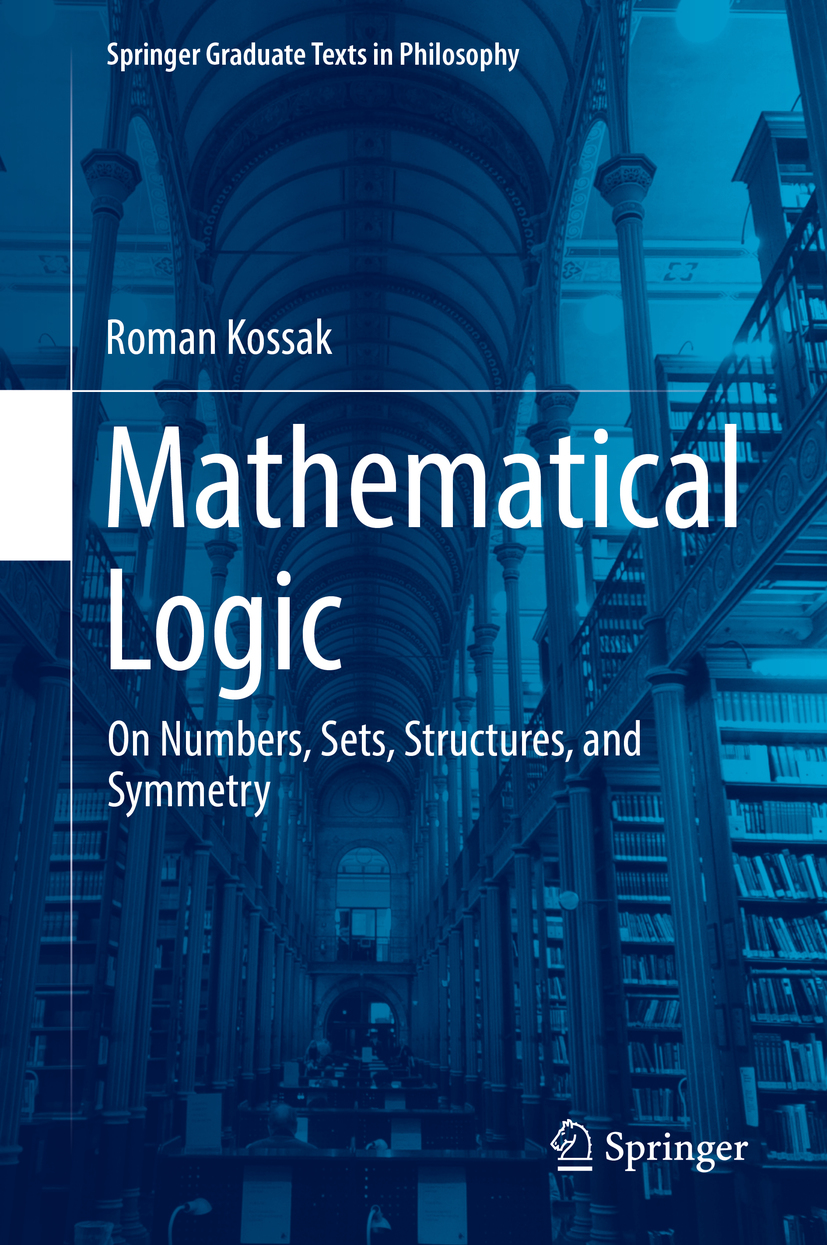
The Springer Graduate Texts in Philosophy offers a series of self-contained textbooks aimed towards the graduate level that covers all areas of philosophy ranging from classical philosophy to contemporary topics in the field. The texts will, in general, include teaching aids (such as exercises and summaries), and covers the range from graduate level introductions to advanced topics in the field. The publications in this series offer volumes with a broad overview of theory in core topics in field and volumes with comprehensive approaches to a single key topic in the field. Thus, the series offers publications for both general introductory courses as well as courses focused on a sub-discipline within philosophy.
All of the philosophical traditions
Includes sourcebooks, lectures notes for advanced level courses, as well as textbooks covering specialized topics
Interdisciplinary introductions where philosophy overlaps with other scientific or practical areas.
A short synopsis of the work or the introduction chapter
The proposed Table of Contents
CV of the lead author(s)
List of courses for possible course adoption
The series discourages the submission of manuscripts that are below 65,000 words in length.
More information about this series at http://www.springer.com/series/13799

This Springer imprint is published by the registered company Springer Nature Switzerland AG
The registered company address is: Gewerbestrasse 11, 6330 Cham, Switzerland
Logic and sermons never convince, The damp of the night drives deeper into my soul. (Only what proves itself to every man and woman is so, Only what nobody denies is so.)
Walt Whitman
, Leaves of Grass
Yet although most members of our species have some capacity for geometrical and numerical concepts, very few human beings have much capacity for doing or even understanding mathematics. This is often held to be the consequence of bad education, but although education can surely help, there is no evidence that vast disparity of talent, or even interest in, mathematics, is a result of bad pedagogyA paradox: we are the mathematical animal. A few of us have made astonishing mathematical discoveries, a few more of us can understand them. Mathematical applications have turned out to be a key to unlock and discipline nature to conform to some of our wishes. But the subject repels most human beings.
Does every positive number have a square root?
Yes.
What is the square root of four?
Two.
What is the square root of two?
The square root of two.
Good. What is the square root of the square root of two.
The square root of the square root of two.
Good. Sit down.
The professor smiled. He liked my answers, and I was happy with them too. It seemed I had understood something and that this understanding was somehow complete. The truth was simple, and once you grasped it, there was nothing more to it, just plain simple truth. Perhaps such rare satisfying moments were the reason I decided to study mathematics.
In my freshmen year at the University of Warsaw, I took Analysis, Abstract Algebra, Topology, Mathematical Logic, and Introduction to Computer Science. I was completely unprepared for the level of abstraction of these courses. I thought that we would just continue with the kind of mathematics we studied in high school. I expected more of the same but more complicated. Perhaps some advanced formulas for solving algebraic and trigonometric equations and more elaborate constructions in plane and three-dimensional geometry. Instead, the course in analysis began with defining real numbers. Something we took for granted and we thought we knew well now needed a definition! My answers at the blackboard that I had been so proud of turned out to be rather naive. The truth was not so plain and simple after all. And to make matters worse, the course followed with a proof of existence and uniqueness of the exponential function f ( x )= ex , and in the process, we had to learn about complex numbers and the fundamental theorem of algebra. Instead of advanced applications of mathematics we have already learned, we were going back, asking more and more fundamental questions. It was rather unexpected. The algebra and topology courses were even harder. Instead of the already familiar planes, spheres, cones, and cylinders, now we were exposed to general algebraic systems and topological spaces. Instead of concrete objects one could try to visualize, we studied infinite spaces with surprising general properties expressed in terms of algebraic systems that were associated with them. I liked the prospect of learning all that, and in particular the promise that in the end, after all this high-level abstract stuff got sorted out, there would be a return to more down-to-earth applications. But what was even more attractive was the attempt to get to the bottom of things, to understand completely what this elaborate edifice of mathematics was founded upon. I decided to specialize in mathematical logic.
Font size:
Interval:
Bookmark:
Similar books «Mathematical Logic»
Look at similar books to Mathematical Logic. We have selected literature similar in name and meaning in the hope of providing readers with more options to find new, interesting, not yet read works.
Discussion, reviews of the book Mathematical Logic and just readers' own opinions. Leave your comments, write what you think about the work, its meaning or the main characters. Specify what exactly you liked and what you didn't like, and why you think so.

